Tag: 2022
Engaging Community and Mobilizing Data to Advocate for Change

Join us virtually at 1:00 p.m. (CT) on October 3, 2022, for a conversation about community engagement and data for change.
Retirement Plans Poised to Benefit From Student Loan Forgiveness (Links to an external site)
The Wall Street Journal shares how money received from the student loan forgiveness program will help people achieve other financial goals.
The Future of Building Wealth: Research, Policy & Action

Join us for the in-person event, “The Future of Building Wealth: Research, Policy & Action,” from 2 p.m. to 5 p.m. (CT) on Oct. 11, 2022 with a reception to follow.
Setting a Bigger Table: Participatory Approaches to Evaluating Impact
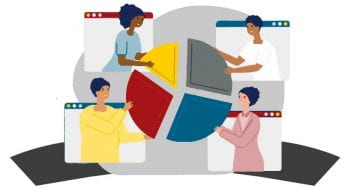
Join us virtually at 1:00 p.m. (CT) on September 8, 2022, for a conversation on designing a collaborative data process to evaluate programs and create more equitable outcomes.
Humanizing artificial, expanding intelligence: Putting AI in context with the social sciences and the social sector
The relationships between artificial intelligence (AI), the social sciences, and the social sector have incredible potential. It is easy to imagine a disconnect between something that is, in name, artificial, and the study and support of human relationships. How are advancements in data science, such as AI, furthering the missions and shared objectives of non-profits, […]
Bridging community knowledge into social policy
By Abaki Beck, research manager at the Social Policy Institute I grew up picking root medicine with my family, knowledge passed down to my grandmother and aunts from their mother, and to my grandmother from her mother. I also grew up with a dedication to community activism from witnessing the health, economic and educational disparities […]
Let the Child Tax Credit work (Links to an external site)

Brookings shares research on the significant, lifelong effects and benefits programs like 2021’s Child Tax Credit have on children being raised in poverty and why the argument for declining labor force participation with an expanded CTC is weak.
Congratulations to the newly inducted Graduate Policy Scholars from the 2021-2022 cohort!
Congratulations to the fifth cohort of the Graduate Policy Scholars who were inducted as scholars this May. Students represented departments across the university, including Arts & Sciences, Brown School, School of Medicine, School of Law, and the Olin Business School. The students who completed this rigorous program learned and engaged with policy as they developed […]
W.T. Grant Foundation awards $512k to study impact of Choice Neighborhood Initiative
Press release: June 8, 2022 Jason Jabbari, research assistant professor with the Social Policy Institute at Washington University in St. Louis, received a $512k grant from The William T. Grant Foundation to understand if and how the Choice Neighborhood Initiative (CNI) reduces racial inequalities in academic outcomes for children and youth. Alongside Jabbari, co-principal investigators […]
The financial impacts of a near-miss with natural disasters

By Dan Zhao, postdoctoral research associate, and Michal Grinstein-Weiss, director When disaster strikes, it is easy to neglect the people on the boundaries. When assessing the impact of adverse economic shocks, whether it be natural disasters, pandemics, or factory shutoffs, the focal point is on those who were directly devastated by the shock. However, the […]
Social Policy Institute researchers gain insights from APPAM conference
Three Social Policy Institute (SPI) team members, Jason Jabbari, research assistant professor, Yung Chun, data analyst III, and Laura Brugger, data analyst III, traveled to Austin, Texas at the end of March to present SPI research at the Association for Public Policy Analysis & Management (APPAM) 2021 Fall Conference. The theme of the conference was […]
It’s a Process, Not a Product: Building Equitable Data Infrastructure

Join us at 10 a.m. on July 14, 2022, to connect with social sector colleagues to learn how to build equitable, client-centered data infrastructure.
Sharing Data, Sharing Power: Tools and Tensions in Collective Data Efforts

Join us at 1 p.m. on June 15, 2022, to learn about transparent, equitable, and actionable practices for sharing data across organizations and sectors in St. Louis and beyond.
Expansion of Child Tax Credit Helped Feed Children in West Virginia (Links to an external site)

West Virginia Public Broadcasting interviewed Leah Hamilton, associate professor at SPI, about the effects of the child tax credit on families, highlighting SPI’s finding that 52% of West Virginian parents reported spending the payment on food.
As the child tax credit draws to a close, yet another study highlights its positive impact (Links to an external site)
Marketplace references an SPI study on the expanded child tax credit which examined the ways in which CTC recipients used the payments.
Experts wrangle over impact of now-defunct expanded child tax credit (Links to an external site)

Deseret News highlights a recent SPI study on the expanded child tax credit, examining the ways in which parents used the payments.
Brookings survey discusses tax credit (Links to an external site)

The Intelligencer highlighted the recent SPI study looking at how parents used the payments not only for basic needs, but also to invest in their children’s futures.
Child Tax Credit Payments Helped Parents Avoid Selling Plasma, Taking Payday Loans (Links to an external site)

HuffPost highlights findings from an SPI study on the CTC that show the payments enabled many parents to stop resorting to risky ways to make ends meet.
New report suggests Child Tax Credit reduced usage of high-cost financial services
Press Release: April 14, 2021 St. Louis (April 14, 2022)— In a new report published with the Global Economy and Development program at Brookings Institution, researchers at the Social Policy Institute at Washington University in St. Louis and Appalachian State University found that families who were eligible for the child tax credit (CTC) experienced improved nutrition, decreased […]
Many parents relying on the Child Tax Credit left the workforce after payments expired (Links to an external site)
Yahoo Money interviewed Stephen Roll, research assistant professor at SPI, about the spike in unemployment in parents following the termination of the CTC payments.
Study Finds Employment Declined for Parents After Ending Monthly CTC Payments (Links to an external site)
Basic Income Today featured results from an SPI study on the child tax credit, finding that the termination of the CTC was followed by households experiencing decreased employment.
Study Counters Claims That the Child Tax Credit Increased Unemployment (Links to an external site)
The National Interest cites a recent SPI study by Stephen Roll, Yung Chun, and Leah Hamilton, that found no evidence that the increased payments led to parents leaving their jobs.
Data-Informed, Equity-Driven: Cultivating a Collaborative Data Culture
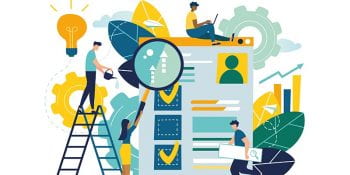
Thanks for joining us for the event on May 4, 2022! Find resources and the recording to learn more about cultivating a data culture that centers on collaboration and equity.
Start Where You Are: Mapping a Journey Toward Equitable Data Practice

Join us at 1 p.m. on April 6, 2022, to connect with social sector colleagues around actionable tools for crafting a data strategy aligned with your mission and values
SPI sessions at Association for Public Policy Analysis and Management (APPAM)
Three Social Policy Institute researchers will present their papers and host discussions at the Association for Public Policy Analysis and Management (APPAM) conference on March 28-29, 2022. Below are the papers and discussions presented by the SPI team. 10:15 a.m. (CT) on Monday, March 28, 2022 “Precarious Homeownership and Housing Inequity During the COVID-19 Pandemic” […]
We Are All Data People: An Equity-Centered Approach to Increasing Impact
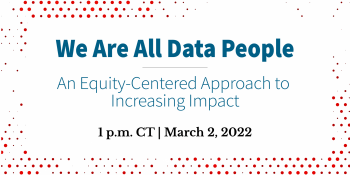
The launch of a series of free learning opportunities for increasing social sector impact, capacity and connection around data. About this event Social sector organizations can increase their impact and advance their missions by cultivating effective, ethical, and equitable data practices. Based on St. Louis social sector input, the Data for Social Impact initiative is […]
Child Tax Credit helped some parents start their own business, study finds (Links to an external site)

Stephen Roll, associate director of research at the Social Policy Institute, was interviewed by Yahoo! Money about a recent survey that found that employment did not decline during the period that the Child Tax Credit was in effect.
With the support of the child tax credit, some parents launched businesses last year (Links to an external site)
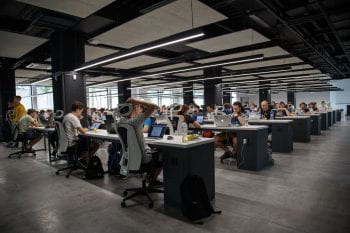
CNBC News interviewed Stephen Roll, SPI research assistant professor, about the effects of the child tax credit on families and the workforce.
Study: Enhanced Child Tax Credit Helped Parents Start Own Businesses (Links to an external site)
The Center for the National Interest highlighted SPI’s study finding that the Child Tax Credit supported parents to start their own small businesses.
Study finds more entrepreneurship among Child Tax Credit recipients (Links to an external site)
AS news summary featured an SPI study which found no evidence that the child tax credit payments negatively affected employment.
Murphy: I’m 25. I don’t have children. But I know the Child Tax Credit is an opportunity we can’t afford to miss. (Links to an external site)
Loudoun Times-Mirror cites results from a recent SPI study which examined the impact of the CTC on employment.
Money on the table: child credit $ available via tax returns (Links to an external site)
The Associated Press shared research from SPI that found that the Child Tax Credit hasn’t changed employment.
Analysis: Child Tax Credit Did Not Cause Labor Force Exit (Links to an external site)
The Center for the National Interest discussed SPI’s recent Child Tax Credit (CTC) study which found that the CTC did not create a significant change in the labor force.
Study: Expanded child tax credits did not reduce employment (Links to an external site)
Phys Org published an article from The Source which shared results from an SPI study finding that the child tax credit payments did not affect employment.
Expanded Child Tax Credit didn’t cut labor force (Links to an external site)

Futurity shared a recent analysis by researchers at SPI and Appalachian State University which found no evidence that the child tax credit payments encouraged unemployment.
Expanded child tax credits did not reduce employment, study finds (Links to an external site)
The Source shares results from a recent SPI study which shows that employment among parents did not decrease following the child tax credit payments.
Inclusive Growth in St. Louis Events
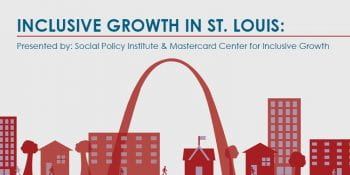
Who benefits from economic growth in St. Louis? Despite promises of job creation, increasing home values, new businesses, and representative leadership in St. Louis, the benefits of economic growth have not been equally, nor equitably, distributed. As the economy rebuilds itself from COVID-19 devastation, now is the time to consider how St. Louis can become […]
What’s Happening With The Child Tax Credit (Links to an external site)

Forbes interviewed Dr. Leah Hamilton, SPI faculty affiliate, about the additional benefits of the CTC due to its lack of work requirement conditions for parents.
The expanded child tax credit briefly slashed child poverty. Here’s what else it did (Links to an external site)

NPR highlights a recent SPI study which analyzed spending data to find the ways in which families utilized their child tax credit payments.
Apprenticeships increase employment, earnings, and optimism in the technology sector (Links to an external site)
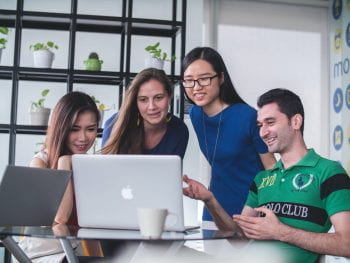
Given the novel and rapidly changing nature of the labor market, learning new skills quickly will become an increasingly important aspect of workforce development and social mobility. The Social Policy Institute investigates LaunchCode, a St. Louis boot camp with an apprenticeship model, as a viable option to increase wealth-building opportunities and upskill a more diverse labor […]
How Wealth Inequality Shapes Life in the St. Louis Region (Links to an external site)
Yung Chun, data analyst III at SPI, and Selina Miller, postdoctoral research assistant, were interviewed by the St. Louis Public Radio on wealth inequality in the U.S.
Joe Manchin worried child tax credit would lead to smaller workforce, but job numbers rose (Links to an external site)
Newsweek highlights a recent study from SPI and Humanity Forward which found that most parents planned to keep working after receiving the CTC.
New Year greetings from the director

Thank you for being a valued member of the Social Policy Institute community this past year. I am extremely proud of our team—staff, faculty affiliates, funders and community partners—who work so hard to make the world more equitable for everyone. Our mission to make the world more equitable by applying innovative, evidence-based solutions to complex social problems […]
Study shows spike in COVID-related depression, anxiety among Israeli teens (Links to an external site)
The Cleveland Jewish News highlighted results from a recent SPI study which found an increased number of children suffering from anxiety after the pandemic.
Eating Disorders, Depression Increased Among Israeli Teens During Covid-19 Pandemic, Study Finds (Links to an external site)
The Algemeiner shared a recent SPI study showing a significant increase in anxiety in children following the pandemic.
Timely research from the Social Policy Institute influences policy in Israel (Links to an external site)
Researchers at SPI have worked hard throughout the pandemic to study the socioeconomic effects of COVID-19, both in the U.S. and in Israel. Global highlights how this work has informed public policy.
Beyond the Buzzwords: What is “Data for Social Impact,” and why does it matter?
Social sector organizations can increase impact, both individually and collectively, by being more strategic in how they engage with data. There is no one-size-fits-all approach, but rather a range of processes and practices for individuals and organizations to consider as they grapple with complex challenges in their communities.
Monthly child tax credit payments have stopped. Will they be back? (Links to an external site)
Deseret News highlighted results from an SPI study analyzing the impact of the child tax credit payments.
Celebrating the Inclusive Growth in St. Louis Advisory Committee
After an incredible 18-month engagement and 6-part event series, the Social Policy Institute and the Mastercard Center for Inclusive Growth honored the Inclusive Growth in St. Louis advisory committee on Dec. 7, 2021, at Justine Petersen’s Greencubator.